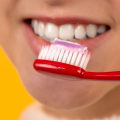Gum diseaseBrush your teeth twice a day with fluoride toothpaste, floss regularly, visit your dentist routinely for a checkup and cleaning. Tell the dentist about any medical conditions you have and the medications you are taking. Eat a well-balanced diet, stop smoking. Smoking increases the risk of gum disease.
Practicing good dental care from childhood to adulthood can help a person keep their teeth and gums healthy. Brushing and flossing your teeth every day, not smoking, eating a healthy diet, and having regular dental checkups can help people avoid cavities, gum disease, and other dental problems. It can also benefit your overall health. Although most people brush regularly, many don't clean between their teeth, and some people don't have regular dental check-ups.
A few small changes in your daily routine can make a big difference in the long run. The dental team can remove any buildup on your teeth and treat any gum disease that has already occurred. But daily dental care depends on you, and the main weapons are toothbrush, toothpaste, and interdental cleaning (cleaning between teeth). If you find that you regularly use mouthwash just to freshen your breath, consult your dental team, because bad breath can be a sign of unhealthy teeth and gums or general poor health.
When buying oral health products, the best general rule of thumb is to look for the ADA Seal of Acceptance. If you visit your dental team regularly, you will need less treatment and they will detect any problems sooner, which will make treatment easier. The authors of a systematic review concluded that reducing this to 5 percent would further reduce the risk of tooth decay and other dental problems. The dentist will check for visual signs of tooth decay, gum disease, oral cancer, and other oral health problems.
People should brush in small circular motions, taking care to brush the front, back, and top of each tooth. If you have warning signs such as toothache, bleeding gums, loose teeth, or chronic bad breath, schedule a dental visit. Taking good care of your mouth and teeth throughout life can help prevent dental and medical problems. We also have great oral health tips on brushing, nutrition, and saving money with your oral health.
If it's been more than six months since your last dental cleaning, schedule an appointment with your dentist right away. The CDC notes that smoking is a risk factor for gum disease, while the ADA warns that people who smoke may experience slow healing after a dental procedure. A healthy smile can be a big advantage; and because this is so important, it makes sense to give your teeth the best care possible. Most dental health professionals recommend gently pushing the floss up to the gumline before hugging the side of the tooth with up and down movements.
Be sure to tell your dentist if you have experienced any changes in your general health or in any medications you are taking since your last visit to the dentist.



